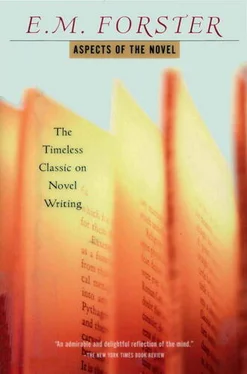There we touch the limit of our subject. We are not concerned with the prophet's message, or rather (since matter and manner cannot be wholly separated) we are concerned with it as little as possible. What matters is the accent of his voice, his song. Hetty might have a good dream in prison, and it would be true of her, satisfyingly true, but it would stop short. Dinah would say she was glad, Hetty would recount her dream, which, unlike Mitya's, would be logically connected with the crisis, and George Eliot would say something sound and sympathetic about good dreams generally, and their inexplicably helpful effect on the tortured breast. Just the same and absolutely different are the two scenes, the two books, the two writers.
Now another point appears. Regarded merely as a novelist the prophet has certain uncanny advantages, so that it is sometimes worth letting him into a drawing-room even on the furniture's account. Perhaps he will smash or distort, but perhaps he will illumine. As I said of the fantasist, he manipulates a beam of light which occasionally touches the objects so sedulously dusted by the hand of common sense, and renders them more vivid than they can ever be in domesticity. This intermittent realism pervades all the greater works of Dostoevsky and Herman Melville. Dostoevsky can be patiently accurate about a trial or the appearance of a staircase. Melville can catalogue the products of the whale ("I have ever found the plain things the knottiest of all," he remarks). D. H. Lawrence can describe a field of grass and flowers or the entrance into Fremantle. Little things in the foreground seem to be all that the prophet cares about at moments—he sits down with them so quiet and busy like a child between two romps. What does he feel during these intermittencies? Is it another form of excitement, or is he resting? We cannot know. No doubt it is what A.E. feels when he is doing his creameries, or what Claudel feels when he is doing his diplomacy, but what is that? Anyhow, it characterizes these novels and gives them what is always provocative in a work of art: roughness of surface. While they pass under our eyes they are full of dents and grooves and lumps and spikes which draw from us little cries of approval and disapproval. When they have past, the roughness is forgotten, they become as smooth as the moon.
Prophetic fiction, then, seems to have definite characteristics. It demands humility and the absence of the sense of humour. It reaches back—though we must not conclude from the example of Dostoevsky that it always reaches back to pity and love. It is spasmodically realistic. And it gives us the sensation of a song or of sound. It is unlike fantasy because its face is towards unity, whereas fantasy glances about. Its confusion is incidental, whereas fantasy's is fundamental— Tristram Shandy ought to be a muddle, Zuleika Dobson ought to keep changing mythologies. Also the prophet—one imagines—has gone "off" more completely than the fantasist, he is in a remoter emotional state while he composes. Not many novelists have this aspect. Poe is too incidental. Hawthorne potters too anxiously round the problem of individual salvation to get free. Hardy, a philosopher and a great poet, might seem to have claims, but Hardy's novels are surveys, they do not give out sounds. The writer sits back, it is true, but the characters do not reach back. He shows them to us as they let their arms rise and fall in the air; they may parallel our sufferings but can never extend them— never, I mean, could Jude step forward like Mitya and release floods of our emotion by saying "Gentlemen, I've had a bad dream." Conrad is in a rather similar position. The voice, the voice of Marlow, is too full of experiences to sing, it is dulled by many reminiscences of error and beauty, its owner has seen too much to see beyond cause and effect. T o have a philosophy—even a poetic and emotional philosophy like Hardy's and Conrad's—leads to reflections on life and things. A prophet does not reflect. And he does not hammer away. That is why we exclude Joyce. Joyce has many qualities akin to prophecy and he has shown (especially in the Portrait of the Artist) an imaginative grasp of evil. But he undermines the universe in too workmanlike a manner, looking round for this tool or that: in spite of all his internal looseness he is too tight, he is never vague except after due deliberation; it is talk, talk, never song.
So, though I believe this lecture is on a genuine aspect of the novel, not a fake aspect, I can only think of four writers to illustrate it—Dostoevsky, Melville, D. H. Lawrence and Emily Brontë. Emily Brontë shall be left to the last, Dostoevsky I have alluded to, Melville is the centre of our picture, and the centre of Melville is Moby Dick.
Moby Dick is an easy book, as long as we read it as a yarn or an account of whaling interspersed with snatches of poetry. But as soon as we catch the song in it, it grows difficult and immensely important. Narrowed and hardened into words the spiritual theme of Moby Dick is as follows: a battle against evil conducted too long or in the wrong way. The White Whale is evil, and Captain Ahab is warped by constant pursuit until his knight-errantry turns into revenge. These are words—a symbol for the book if we want one—but they do not carry us much further than the acceptance of the book as a yarn— perhaps they carry us backwards, for they may mislead us into harmonizing the incidents, and so losing their roughness and richness. The idea of a contest we may retain: all action is a battle, the only happiness is peace. But contest between what? We get false if we say that it is between good and evil or between two unreconciled evils. The essential in Moby Dick, its prophetic song, flows athwart the action and the surface morality like an undercurrent. It lies outside words. Even at the end, when the ship has gone down with the bird of heaven pinned to its mast, and the empty coffin, bouncing up from the vortex, has carried Ishmael back to the world—even then we cannot catch the words of the song. There has been stress, with intervals: but no explicable solution, certainly no reaching back into universal pity and love; no "Gentlemen, I've had a good dream."
The extraordinary nature of the book appears in two of its early incidents—the sermon about Jonah and the friendship with Queequeg.
The sermon has nothing to do with Christianity. It asks for endurance or loyalty without hope of reward. The preacher "kneeling in the pulpit's bows, folded his large brown hands across his chest, uplifted his closed eyes, and offered a prayer so deeply devout that he seemed kneeling and praying at the bottom of the sea." Then he works up and up and concludes on a note of joy that is far more terrifying than a menace.
Delight is to him whose strong arms yet support him when the ship of this base treacherous world has gone down beneath him. Delight is to him who gives no quarter in the truth, and kills, burns and destroys all sin though he pluck it out from under the robes of Senators and Judges. Delight—top-gallant delight is to him, who acknowledges no law or lord, but the Lord his God, and is oniy a patriot to heaven. Delight is to him, whom all the waves of the billows of the seas of the boisterous mob can never shake from this sure Keel of the Ages. And eternal delight and deliciousness will be his, who coming to lay him down, can say with his final breath—O Father!—chiefly known to me by thy rod—mortal or immortal, here I die. I have striven to be Thine, more than to be this world's or mine own. Yet this is nothing: I leave eternity to Thee: for what is man that he should live out the lifetime of his God?
I believe it is not a coincidence that the last ship we encounter at the end of the book before the final catastrophe should be called the Delight; a vessel of ill omen who has herself encountered Moby Dick and been shattered by him. But what the connection was in the prophet's mind I cannot say, nor could he tell us.
Читать дальше












